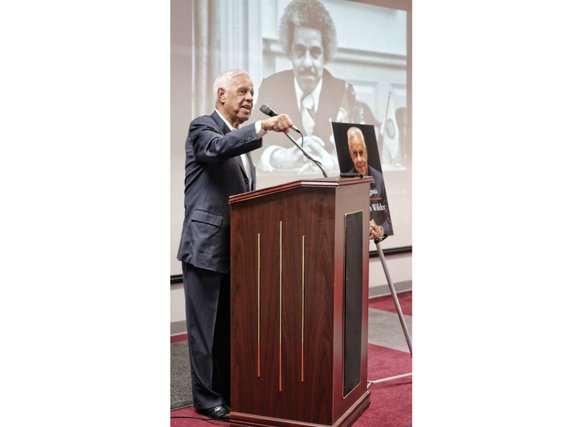Former presidential candidate Wilder offers advice to Clinton campaign
Joey Matthews | 2/5/2016, 7:34 a.m.
By Joey Matthews
Former Virginia Gov. L. Douglas Wilder — the nation’s first elected African-American governor and one-time Democratic presidential candidate — issued a cautionary warning to Democratic presidential front-runner Hillary Clinton’s campaign prior to a talk and book-signing event Tuesday at his alma mater, Virginia Union University.
When a Free Press reporter asked him to assess Mrs. Clinton’s skintight victory over Democratic rival U.S. Sen. Bernie Sanders in Monday’s Iowa caucuses, he said, “I was shocked that it was that close.”
“I think everyone will see now that the only way Hillary Clinton will get the nomination is with a massive African-American vote,” he added. “Without that, it’s gone.”
The former U.S. secretary of state edged out Sen. Sanders by less than a percentage point in the first leg of the presidential nominating process. Voters are shifting their focus to the potential outcome of the next contest — the New Hampshire primary that takes place Tuesday, Feb. 9.
In 2008 and 2012, President Obama’s presidential victories were fueled largely by huge turnouts from African-American voters, where he earned well in excess of 90 percent of the black vote, including in Virginia.
Political pundits also have forecast Mrs. Clinton will need substantial support from the African-American community if she is to prevail in the primary process or be successful in November’s general election against an as-yet undetermined Republican contender.
Riding the wave of popularity and national publicity his election as governor brought in November 1989, Mr. Wilder announced midway through his four-year term that he was seeking the Democratic nomination for president. His candidacy lasted just under four months, from Sept. 13, 1991, to Jan. 8, 1992, when he announced he didn’t have time to seek the nation’s highest office and effectively run the state.
At the book signing, Mr. Wilder said that he is not ready to endorse a candidate for president at this point.
Minutes later, the governor broached the subject of the African-American vote again in his address to about 100 people in the L. Douglas Wilder Library & Learning Resource Center, where he also autographed copies of his new autobiography, “Son of Virginia: A Life in America’s Political Arena.”
When people talk about a candidate’s possibility of being elected president, “you hear, and I hear someone always saying, ‘We’ve just to have the young people’s vote for this to happen. We’ve just to get that millennial vote. We’ve just got to get the women’s vote. Don’t forget the Hispanic vote. We’ve got to have it.’
“Now I want you to raise your hands. How many of you have heard anyone publicly proclaim, ‘We have got to have the African-American vote?’
“And you won’t hear it,” he said. “People say, ‘Well, you know, they take us for granted.’ Well, what do you do about it? When you stand up, you’re not a team player.”
Mr. Wilder told the young people in the audience that it was important for them to attain the best education they can.
“When I was growing up, it was not are you going to college, but, where are you going to college?” he said.
“If you have no more than education,” he later added, “you are one step ahead of the person who doesn’t have it.”
In opening remarks, VUU President Claude G. Perkins introduced Mr. Wilder — who grew up in Church Hill and served in the state Senate, as lieutenant governor and as Richmond’s mayor — as a “man from the East End who has gone to the far ends of the world to carry the message of hope, equality and dignity to mankind.”
Richmond residents and longtime friends LaVerne Cooper and Florence Neal Cooper Smith said they were thrilled they could come to see Mr. Wilder at the book signing event.
“We went to Armstrong High School with him from 1943 through 1947 and then went to Virginia Union with him from 1947 through 1951,” Mrs. Cooper said. “And our husbands were members of the Omega Psi Phi Fraternity with him and they were all friends. And we still stay in touch with him today,” she added.
“We’re so proud of him,” Mrs. Smith said. “He’s always been a leader and a go-getter.”
Former Richmond Judge Willard H. Douglas Jr., who sat near the former governor, noted that when he was elected in 1974 by the General Assembly and became the state’s first full-time African-American judge, it was then-Sen. Wilder who had nominated him.
“He helped me and a lot of other people along the way,” the retired judge said. “He has been a great public servant for the state and the nation.”
After his address, about 70 people lined up to have their books signed by Mr. Wilder.
Dr. Gerard McShepard, chair of VUU’s Department of Natural Sciences, was first in line.
“We talk about him in one of my classes on African-American perspectives in science,” Dr. McShepard said. “He graduated from Virginia Union with a degree in chemistry and we talk about how he used his degree in the STEM field to accomplish all that he has.”
Behind him, Delores Llewellyn, an associate math professor, said, “He’s an inspiration to all of us on what you can become in life with hard work and determination.”
Jamal Ciego, a VUU junior majoring in history and political science, said he wanted to see “in person the first elected African-American governor in the nation, who has done a lot of great things. He’s an inspiration to a lot of people like me.”







